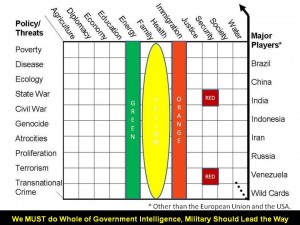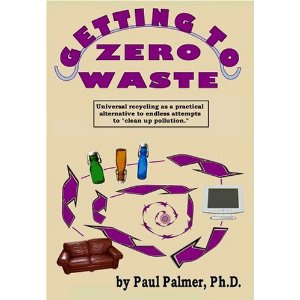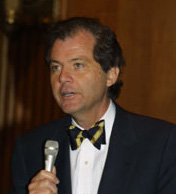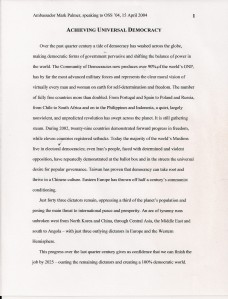Edit of 21 Dec 07 to add links and new comment,
New Comment: In my view, this is the single most important work of the century with respect to American moral diplomacy. I note with concern that under Bush-Cheney “Failed States” have increased from 75 in 2005 to 177 in 2007. We've lost our mind, and our morals, as a Nation.
Ambassador Mark Palmer puts to rest all those generally unfair stereotypes of Foreign Service Officers as “cookie pushing” softies who fall in love with their host countries and blame America for any flaws in the bi-lateral relationship. With this book he provides an inspiring model for precisely what every Foreign Service Officer should aspire: to understand, to articulate, and then to implement very great goals that serve democracy and help extend the bounty of the American way of life–moral capitalism and shared wealth–to every corner of the world.
This is a detailed and practical book, not just visionary. It is useful and inspiring, not just a personal view. It is also a damning indictment of fifty years of US White House and Congressional politics, where in the name of anti-communism and cheap oil America–regardless of which party has been in power, has been willing to consort with the most despotic, ruthless, murderous regimes in the history of mankind. Still alive today and still very much “friends” of the U.S. Government are dictators that think nothing of murdering millions.
There has been some improvement, offset by an increase in partly free countries. From 69 countries not free at all in 1972 we now have 47. From 38 countries partly free in 1972 we now have 56, many of those remnants of the former Soviet Union. Free countries have nearly doubled from 43 to 89, but free and poor is quite a different thing from free and prosperous.
The level of detail and also of brevity in this book is quite satisfying. On the one hand, Ambassador Palmer provides ample and well-documented discussion of the state of the world, on the other he does not belabor the matter–his one to two-paragraph summative descriptions of each of the dictatorships is just enough, just right.
He distinguishes between Personalistic Dictatorships (20, now less Hussein in Iraq); Monarch Dictators (7, with Saudi Arabia being the first in class); Military Dictators (5, with US allies Sudan and Pakistan and 1 and 2 respectively); Communist Dictators (5); Dominant-Party Dictators (7); and lastly, Theocratic Dictators (1, Iran).
Ambassador Palmer makes several important points with this book, and I summarize them here: 1) conventional wisdom of the past has been flawed–we should not have sacrificed our ideals for convenience; 2) dictatorships produce inordinate amounts of collateral damage that threatens the West, from genocide and mass migrations to disease, famine, and crime; 3) there is a business case to be made for ending U.S. support for dictatorships, in that business can profit more from stable democratic regimes over the long-term; and lastly, 4) that the U.S. should sanction dictators, not their peoples, and we can begin by denying them and all their cronies visas for shopping expeditions in the US.
The book has an action agenda that is worthy, but much more important is the clear and present policy that Ambassador Palmer advocates, one that is consistent with American ideals as well as universal recognition of human rights. Ambassador Palmer's work, on the one hand, shows how hypocritical and unethical past Administrations have been–both Democratic and Republican–and on the other, he provides a clear basis for getting us back on track.
I agree with his proposition that we should have a new Undersecretary for Democracy, with two Assistant Secretaries, one responsible for voluntary democratic transitions, the other for dealing with recalcitrant dictators. Such an expansion of the Department of State would work well with a similar change in the Pentagon, with a new Undersecretary for Peacekeeping Operations and Complex Emergencies, my own idea.
This is a very fine book, and if it helps future Foreign Service Officers to understand that diplomacy is not just about “getting along” but about making very significant changes in the world at large, then Ambassador Palmer's work will be of lasting value to us all.
Also recommended, with reviews:
A Power Governments Cannot Suppress
The Unconquerable World: Power, Nonviolence, and the Will of the People
Blood Money: Wasted Billions, Lost Lives, and Corporate Greed in Iraq
The Sorrows of Empire: Militarism, Secrecy, and the End of the Republic (The American Empire Project)
The Fifty-Year Wound: How America's Cold War Victory Has Shaped Our World
War Is a Racket: The Anti-War Classic by America's Most Decorated General, Two Other Anti=Interventionist Tracts, and Photographs from the Horror of It
The Paradox of American Power: Why the World's Only Superpower Can't Go It Alone
The Tao of Democracy: Using Co-Intelligence to Create a World That Works for All
The World Cafe: Shaping Our Futures Through Conversations That Matter
Faith-Based Diplomacy: Trumping Realpolitik
Forthcoming on Amazon in February and also free at OSS.Net/CIB:
COLLECTIVE INTELLIGENCE: Creating a Prosperous World at Peace, edited by Mark Tovey with a Foreword by Yochai Benkler and an Afterword by the Rt. Hon. Paul Martin, Prime Minister of Canada. I have high hopes for all of us finally getting it right (Winston Churchill: “The Americans always do the right thing, they just try everything else first.”) Now is our time to get it right. We can start by electing Senator Barack Obama as our forward-thinking always listening open-minded President.









